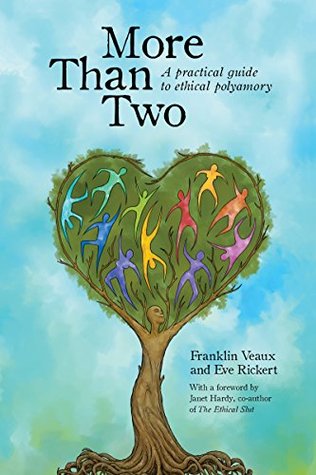More on this book
Community
Kindle Notes & Highlights
Read between
May 9 - July 12, 2023
As Eve and Franklin emphasize throughout the book, polyamory takes courage. To me, this means the courage to step outside of our personal comfort zones and familiar relationship paradigms to boldly explore the thrilling and sometimes terrifying edges of our capacity to love more.
commitment to being there when your partners need you, to investing in their happiness, to building a life with them, to creating happy and healthy relationships that meet everyone’s needs, and to supporting one another when life gets hard.
polyamory can be complicated—but where’s the virtue in a simple life?
If the big shady oak tree that you’ve loved for decades is shading your entire garden so that nothing else can take root, you might need to gently prune some of the tree’s branches to let in light.
With poly relationships, it’s tempting to plan out how you want your life to look and then search for people who fit the plan. But unlike seeds, people don’t come from a store neatly labeled. You can’t look at a person and predict what a relationship will grow into; relationships have a tricky way of zigging when you expect them to zag. Sure, it’s important to communicate what you want in your relationships up front—but it’s also important to remember you’re not ordering a relationship from a catalog. Leave space for them to grow, and don’t freak out if they grow in ways you didn’t expect.
We have found that poly relationships thrive most readily when they are free to change and adapt. When the people in the relationship are more important than the structure of the relationship—when they are free to advocate for their needs, to grow even in unexpected ways, when they feel a sense of personal empowerment over their relationships—the relationships themselves tend to be strong, resilient and happy.
Above all else, trust that you don’t have to control your partner, because your partner, given the freedom to do anything, will want to cherish and support you. And always, always move in the direction of greatest courage, toward the best possible version of yourself.
The people in a relationship are more important than the relationship.
Understanding and programming your own mind is your responsibility; if you fail to do this, the world will program it for you, and you’ll end up in the relationship other people think you should have, not the relationship you want.
And this is when it really matters whether you’ve committed, with all your heart and soul, to being poly. If you don’t commit, if you aren’t ready for that dark night of the soul, and you back away in fear when it comes, then you and people you love are going to get very hurt. So be ready. Because if you step into it and keep walking, you will get through it. It ends. Know that you’re not alone: thousands of people before you have walked this path—not exactly yours, of course, but just as dark and scary. It ends. And it’s better on the other side. Getting through that dark night removes its
...more
Courage is a verb, grammarians be damned: it’s not something you have, it’s something you do. You practice a bit every day. And if you fall down, if your courage fails you, you always get another chance. Always. Courage happens in increments. You’ll need courage because polyamorous relationships can be scary. Loving other people without a script is scary. Allowing the people you love to make their own choices without controlling them is scary. The kind of courage we’re talking about involves being willing to let go of guarantees—and love and trust your partners anyway.
Insecurity invents its own evidence and supports its own premises.
security comes more from knowing a partner is free to go but chooses to stay than from attempting to obligate that partner to stay.


